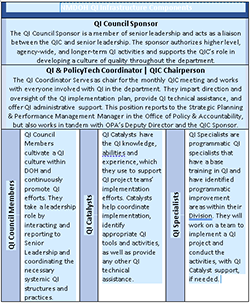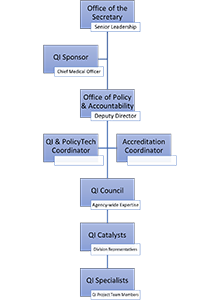Quality Improvement
Quality Improvement Matters
The New Mexico Department of Health is committed to the ongoing improvement of its programs, services, and processes and has an interest in systematically evaluating and improving their quality. When a problem-solving process becomes ingrained into everyday practices, it can be a catalyst for optimizing the program, division, and/or the department’s ability to fulfill its vision – to create a healthier New Mexico. Thus, in order to develop a culture of quality throughout the department, quality improvement and quality assurance processes are invaluable operational activities.
Quality Improvement QI is the use of a deliberate and defined improvement process, such as Plan-Do-Check-Act PDCA, which focuses on activities that are responsive to community needs and improving population health. It refers to a continuous and ongoing effort to achieve measurable improvements in efficiency, effectiveness, performance, accountability, and outcomes. Measurable improvements can be evaluated by the performance management system as well as reflected by better running services and processes benefitting the health of the community.
QI begins with a problem. It continues by determining the root cause of that problem, identifying the customers effected and involved, sorting through any and all quantitative data sources, and using wide-ranging tools to ascertain how to be more effective.
NMDOH’s QI Infrastructure & Organizational Chart
QI Infrastructure Components
Just as QI projects need a team to conduct their quality improvement process, NMDOH has found a range of QI folks to institute an agency-wide sustaining team-oriented culture of quality.


Quality improvement is embedded throughout QI, from the top to the bottom of normal operations. The Office of the Secretary identifies a senior leader to be the QI Sponsor to the QI Council. Together with the Office of Policy & Accountability, these three roles focus on the big picture institution and cultivation of a quality improvement culture throughout NMDOH. The QI Council also works with QI Catalysts to monitor and support QI projects and activities. Thus, they act as the bridge between senior leadership and the QI practitioners. QI Catalysts are division leads, providing their expertise and guidance within their division’s programs and administrative practices. The QI Specialists are the “boots on the ground”, basically the folks conducting QI projects and utilizing QI methods and tools for programmatic improvements.
For more information on NMDOH’s QI infrastructure, check out our New Mexico Department of Health Quality Improvement Plan (2020)} .

